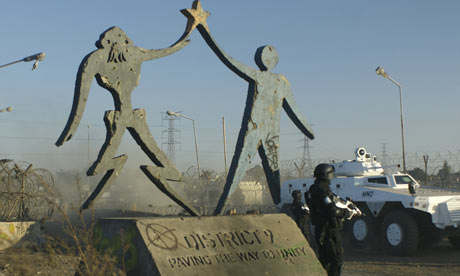 Genre: Science-Fiction / Action-Adventure
Genre: Science-Fiction / Action-Adventure
In the spirit of reinvigorating the original content on this blog, I am now catching up on my unposted reviews (e. g., Public Enemies, Brüno, 500 Days of Summer) by posting this unexpected review of this unexpectedly seen and - dare I say - well received new film, by director and co-writer Neill Blomkamp. It, District 9 - a title that bears the name of the fictional site of its film's action, located in the former seat of apartheid: Johannesburg, South Africa - is indeed an action-based film, even as it traverses bounds well beyond that of the typical action-adventure and flows its way, like a somewhat spectacularly well connected river, channelling through the various social issues that underscore phenomena like racism, stigma, the unknown, the outsider/other, education, consent, ambition, loyalty, and humanity (i. e., what it means to be "human"). With such a spectacular array of topics, one would expect it to be relatively discombobulated, shooting out at ideas perhaps as an overzealous octopus; but, perhaps in order to appease more than the hoards of contemporary fanboys who may flock, as the designated demographic, to the film for its 'aliens v. humans [with cool weapons]' appeal, the film makes use of its sullen, pale tones; rapid cuts and pacing; and fantastical storyline competently enough to bring them all together, to undiffuse the array and concentrate it into a directed and singular ray: a philosopher's stream of consciousness perhaps, that rests on interrelated topics for sometimes the breadth of an instant, in perpetual attempt to find the elemental and binding truth of it all - such an attempt itself, the crucial aspect of any and all science-fiction.
Of course, the more basic tropes of science fiction are there, buried inextricably in the premise and the ultimate resolution of the storyline: the sudden presence of a demonstratively "other [being];" the ensuing internal identity-struggle, actively externalized as a physical struggle; and the manifest resolution that you and he, the self and the other, are none but one in the same. And, of course, these tropes are aptly enough conveyed - nothing unusual. Yet, then quite without warning, they flower, as though dried Asian tea-flowers quietly immersed in water, into the expansive array of questioning and ideas that I've mentioned before.
In the background of post-apartheid South Africa, segregation reemerges as an easy parallel. Human rights issues clutter the fore for a good while, with consent and equality in freedom (despite rank, race, or respect of education) churning the clutterous stew for a while. Then drop in stigma and varied ambition, the psychology of organizations, and the classic 'rules and regulations v. common sense;' and finally ices the piece the essence of humanity, or the overriding morality of being. Though the film is rare to rest upon any one of these ideas consistently or longly enough for it to be declared a serious argument of perspective or personal politics on behalf of the writers and the director, it still weaves a powerful tapestry of questions that its interconnected scenes supply the resources by which those scenes' spectators may answer.
While I'm not very accustomed to waxing on in this way about such a mixture of genres and ideas as there may be found in this film, I am thrilled that I can give myself lieve to do so here. Though I fear for the future of this perhaps newly minted series of films - fear that the sequels that are, no doubt, tipping the tongues of the writer-director and his producers may lose the inquisitive but entirely competent sparkle that has made this (initial?) film special - I nevertheless celebrate District 9 for all its successful challenges and allusions.
Grade: B+, a river run well tread and ventured.
While I'm not very accustomed to waxing on in this way about such a mixture of genres and ideas as there may be found in this film, I am thrilled that I can give myself lieve to do so here. Though I fear for the future of this perhaps newly minted series of films - fear that the sequels that are, no doubt, tipping the tongues of the writer-director and his producers may lose the inquisitive but entirely competent sparkle that has made this (initial?) film special - I nevertheless celebrate District 9 for all its successful challenges and allusions.
Grade: B+, a river run well tread and ventured.





No comments:
Post a Comment